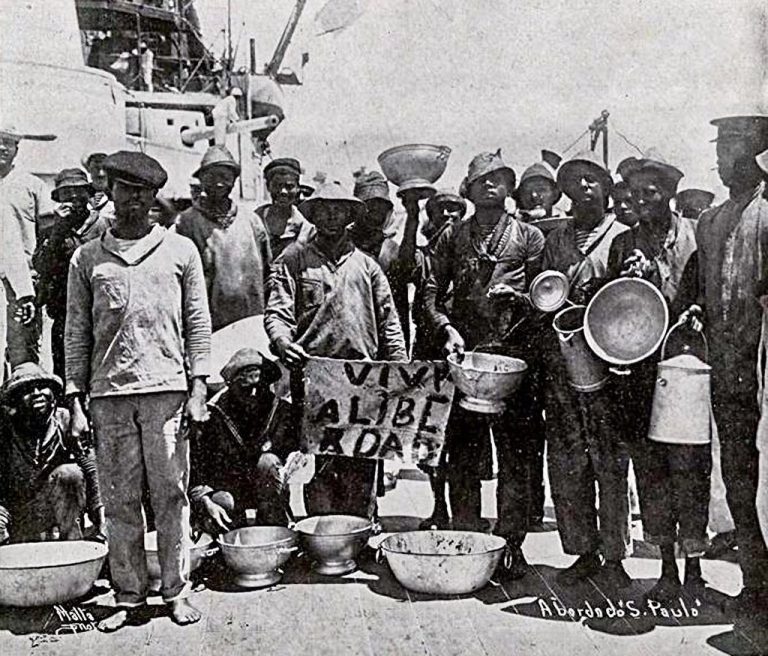Morality is, perhaps, the main component of politics. Political theorists, including realist ones, looked at morality for years, trying to unravel, after all, what would be its arena in the political doing. In the enactment model, for instance, morality is the basis upon which politics is done; it’s, first of all, a booster for organization and without it there wouldn’t be reasons to mobilize. In the structural model, morality offers constraints to strategy, therefore serving as a limiting factor to the political doing.
The root of the problem is that both models are correct. It’s an undeniable fact that only through moral reasons the basis mobilize – and morality is, thus, a booster for the basis – but, on the other hand, it’s also truth that sticking to morality is giving up certain practices – thus, morality constrains the strategy. This is the question which those considerations lead to: is it better to weaken yourself before the basis in the name of strategy or to lose battles not to lose basis?
From advancing without restrains
In the last three or four years, I’ve been continually arguing in this magazine about the necessity of brazilian left to retake on audacity. First, to prevent Dilma’s downfall (that is: it should demonstrate strength before the enemy, not weakness; mobilize itself on the concrete and ignore the abstract , where the enemy succeeded). Then, to face Temer (that is: it should run the risk of seeding chaos, although undesirable, instead of being slowly massacred under the democratic façade). Finally, in the 2018 elections, I also defended a position bolder than those offered by the electoral dispute (after all, the 2016 coup and the resulting increase of military power indicated the “ace up the boots” that the elite prepared in the case of a non-aligned candidate’s victory). All these positions were drawn based upon strategics considerations, not moral ones.
And it is now, after total defeat, that those positions start to popularize. From this, a couple of problems arise: first, it popularized through moral ways, not strategic ones[1]. Second, it popularized in a moment which the enemy no longer operates in the shadows, weakened, on the verge of collapsing, but rather in a moment which the enemy finally has all the possible strategic advantages and eagerly waits to fulfill the promise to use force.
I will start by the second question. In 2015-2016, even though the popularity of Dilma Rouseff’s government was in an evident decline (mostly because of the economic measures adopted by her government), it was not only possible but indispensable that her party responded radically, beyond the institutional façades (since her enemies did operate under them, but beyond its premises). This would force the enemy to retreat, at best, or make way to an open conflict, beyond the institutions, in the worst case. In both cases, the enemy would have to renounce: either its objectives or its strategy, consequently being put in a defensive position. In addition, the government had at its side, in that moment, all possible ideal premises: the legitimacy, the anti-coup narrative (not mattering if real or not) and the authority (not mattering if completed embraced or not), aside from concrete basis relatively ready to mobilize.
In power, Temer had some of those premises; especially the authority to repress (which probably would be obeyed), but had none legitimacy and support. Promote chaos, openly or not (strengthening the 2017 truck drivers’ strike, for example), would put him in a grant or radical position, in which he’d have to open the conflict. If he granted, he would fragilize himself in the concret arena; if he used the sword, he would fragilize himself in the moral arena.
To the tactical retreats
The situation was altered, however, with Jair Bolsonaro’s victory. Beyond all the ideal premises Dilma had, he counts with two more factors at his side: 1 – a relative popularity and good basis (civilian ones – including key sectors of the bourgeoisie, but not only them – plus military ones), and the safe spot of the motto “let’s see what this government can do”, which undermines the adherence to mobilizing against his government and 2- the use of force not only as a strategic option but as a moral motto.
That is to say: the current government has not only all the concrete strategic advantages that it could, therefore being in a much more unfavorable position for its fall or its weakening than the one faced by Dilma, as well as the support of much of the society (or at least the indifference) if it’s compelled to opt by the use of force.
This implies that defeating Bolsonaro is not only about not repeating the strategic errors made by Dilma or the Workers’ Party (starting by the endless disposal to settlements, concessions and the blind trust in institutional approach), but also about considering that past positions I defended are outdated. Demonstrating concrete strength now, in the vanguard, without a fortified rearguard, is a road to succumbing.
In this moment, Bolsonaro is stronger and finds himself in a position more stable than any other force, both in the strategic and moral arena. On the other hand, morally granting, in name of certain “pragmatism” which doesn’t offers concrete advantages, is running the risk of fragilizing itself before the basis and at the same time strengthen the enemy. I’ve already heard that “a bird in the hand is worth two in the bush”, but never heard of “it is better to hand your bird so the enemy behead it, so you keep its dead feathers”, neither “is better to fly up high with the birds, trying to deflect the enemy attack”.
Tactical retreats will be needed, but must be followed by strategic progress: it is the advice derived from the principles of Guerrilla War to retreat if the enemy advances, but to open new fronts, operate in other arenas, gain new basis also are.
And that’s the reason why the great debates concerning the Speaker of House election seems to develop surrounded by an empty moralism, on one hand, and by an useless pragmatism, on the other.
Many speak of the “treason” that is supporting Rodrigo Maia, the current Speaker of the House, arguing in the moral arena – but is this moral option capable of leading to a victory or a concrete gain, in the medium or long term? I don’t speak about only the “Speaker of the House” question, which can not be won by parties that gather, in the better case, 136 chairs; the debate is broader: is this “show of strength” concrete? Does it gather the support basis, fragilizes the enemy, open new fronts? Does it even have the power to become propaganda? Above all else, will this moral principle be taken as a general rule, or will it have margin for possible retreats? If so, starting now, is necessary to treat/handle the strategic questions as they are, not as moral ones.
But others, from the high notes of Pericle’s strategic manuals[2], advocate granting in the moral arena, supporting Rodrigo Maia for gaining the so called strategic benefits, which includes the astounding promise (which, by the way, can be simply broken or only complied under conditions not yet mentioned) to grant to the “left” a seat in the House’s Leadership Board. This board counts, today, with a PSB (Brazilian Socialist Party) member (JHC) as Secretary , a PDT (Labour) member (Dagoverto Nogueira) as an alternate and a PT (Workers’ Party) member (Pedro Uczai) as another alternate. How effective was their place on the Leadership Board to stop Temer’s advances? That is the question which must be made by those, me included, that see a fatal road in this kind of “pragmatism”.
Once again, it does not concern a moral problem, but rather a strategic one: the question is not about granting in the moral arena, is about not getting strategic advances from this grant. Worries, by both sides, that could have some fairness, if they weren’t, apparently, the only worries.
Demarcating a position would be right (but this position is demarcated with which figure? The “revolutionary” one of Marcelo Freixo?) if, coupled with this, there was a serious organizational work. After all, if it’s such a grave sin to abdicate of morality in the name of agreements, wouldn’t it be equally grave to ignore the bare fact that it’s in a position which doesn’t matter if it makes the agreements or not?
It would also be right to grant; but who grants can only do it, equally, from a strong position, with strong basis, to guarantee an useful advantage in return.
Let us return: is it better to weaken yourself before the basis in the name of strategy or to lose battles to not lose basis?
It is better to have strong basis, so it can, before them, weaken itself or give up battles which could be won with them. Otherwise, both options are not, indeed, options: they are empty calculations of a infant who dreams about its old age.
Liked the article? Donate now and help us build counter-hegemonic thinking!
Notes:
[1] – Now the late radicals understand that a show of force is needed because “it’s impossible to bear this government”, “there is no talking with this government”, not because this is a effective way to defeating it. I ask myself if it was possible to tolerate an illegitimate government that advanced handing over our country, as it was Michel Temer’s government, or if was possible to tolerate military staff rehearsing political statements on Twitter. I ask it because, after all, that is what happened.
[2] – In a battle of the Peloponnesian War, Pericles issued an order for his troops to retreat back to Athenas, where they would be secured by the walls. The spartans surrounded the city and isolated it, killing 100.000.







































